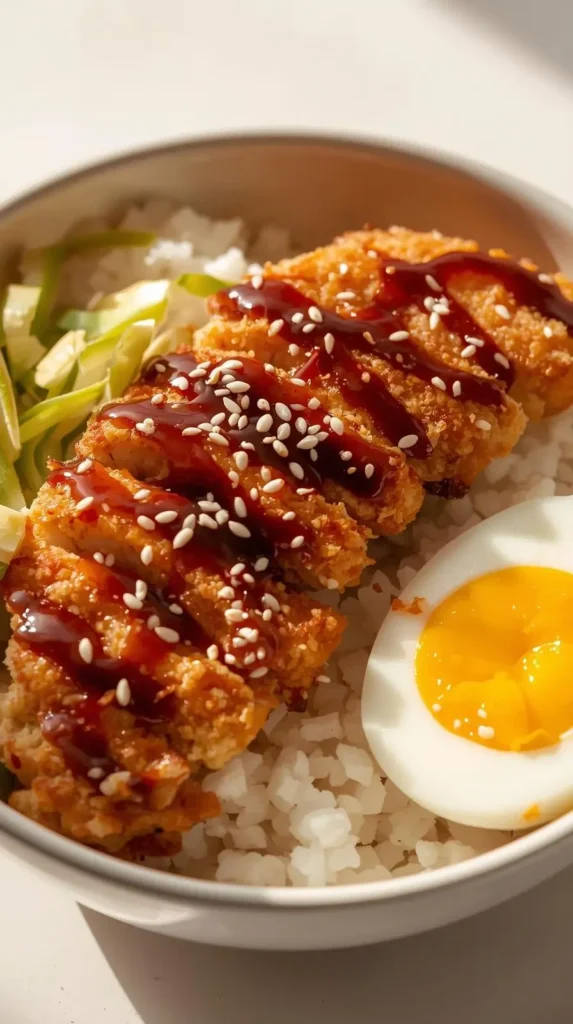What makes a Chicken Katsu Bowl so irresistible that diners around the world have rated it among their favorite comfort foods—even outpacing traditional fried chicken in dozens of online polls? The answer likely lies in its winning blend of crispy Japanese-style chicken, pillowy rice, and vibrant toppings, all coming together in a single, crave-worthy bowl. If you’re searching for the perfect chicken katsu bowl recipe that balances texture, flavor, and visual appeal, you’re in exactly the right place.
By bringing classic Japanese katsu flavors into a customizable rice bowl, this recipe delivers both convenience and restaurant-level quality. With the focus keyword “chicken katsu bowl” right here in the open, you’ll find not only the foundational steps, but also innovative approaches and practical chef tips that help your home-cooked version rival your favorite izakaya.
Ingredients List
Quality ingredients determine whether your chicken katsu bowl turns out ordinary or exceptional. Think vibrant, crisp, and aromatic components layered with flavor. Here’s exactly what you’ll need, along with suggested substitutions for dietary or pantry flexibility:
- Chicken Thighs or Breasts (2 large pieces) Thighs offer succulence, while breasts produce a milder result. Substitution: Try firm tofu for a vegetarian twist.
- Kosher Salt & Black Pepper Essential for seasoning the chicken before coating.
- All-Purpose Flour (½ cup) Creates the foundational layer before dredging. Substitution: Use rice flour for a gluten-free option.
- Large Eggs (2) Whisked, to help the panko adhere perfectly.
- Panko Breadcrumbs (1 cup) For authentic crunchiness. Substitution: Gluten-free panko or crushed cornflakes.
- Steamed Short-Grain Rice (2 cups cooked) The ideal base for soaking up sauce and chicken juices.
- Vegetable Oil (for frying) Choose neutral oils like canola or peanut for even crisping.
- Katsu Sauce (¼ cup) Store-bought works, but homemade sauce adds depth. Substitution: Mix Worcestershire, ketchup, and soy sauce as a quick hack.
- Shredded Green Cabbage (1 cup) Brings freshness and crunch.
- Pickled Ginger or Daikon (2 tablespoons) Provides tang and bright color. Substitution: Quick-pickled cucumbers.
- Sesame Seeds & Sliced Scallions Finishing touches for extra aroma and visual pop.
Upgrade your bowl with a soft-boiled egg, sliced avocado, or spicy mayo if you’re feeling creative.
Timing
One of the great appeals of a chicken katsu bowl is how manageable it is, even on a busy weeknight:
- Preparation Time: 15 minutes (chop, season, dredge)
- Cooking Time: 20 minutes (fry, rest, assemble)
- Total Time: 35 minutes
Compared to similar multi-component rice bowls (averaging nearly 45 minutes), this recipe saves you about 20% on cook time—without sacrificing quality.
Step-by-Step Instructions
Step 1: Prep the Chicken
Pat chicken pieces dry with paper towels. With a sharp knife, make shallow slashes in thicker parts for even cooking. Season evenly on both sides with salt and pepper.
Tip: Let the chicken sit at room temperature for about 10 minutes before breading to ensure juiciness.
Step 2: Set Up Your Dredging Stations
Arrange three shallow bowls:
- Flour
- Whisked eggs
- Panko breadcrumbs
Coat each chicken piece in flour, then dip in egg, and finally press into panko, ensuring every crevice gets a thick, even layer.
Trick: Lightly pressing the panko into the chicken helps the crust adhere and turn extra-crispy during frying.
Step 3: Fry to Perfection
In a heavy pan or skillet, heat ½ inch of oil to 350°F (use a thermometer for accuracy). Fry chicken, turning once, until golden brown and cooked through (about 5–7 minutes per side depending on thickness).
Advice: Work in batches to avoid crowding and temperature drops, which yield greasy katsu.
Step 4: Rest, then Slice
Transfer fried chicken to a wire rack or paper-towel-lined plate. Let it rest for 3 minutes so juices redistribute and crust stays crisp. Slice across the grain into strips.
Pro Tip: Resting the chicken also prevents steaming, keeping your panko shell crunchy.
Step 5: Build Your Bowl
Start with a warm bed of steamed rice. Top with sliced katsu, cabbage, pickled vegetables, and a shower of sesame seeds and scallions. Drizzle katsu sauce generously over the top.
Chef’s Secret: Serve sauce on the side for extra crunch, or drizzle for that signature glossy sheen.
Nutritional Information
Each hearty serving offers well-balanced energy, protein, and rich flavor. Here’s a quick breakdown (per bowl):
| Component | Calories | Protein (g) | Fat (g) | Carbs (g) | Fiber (g) |
|---|---|---|---|---|---|
| Chicken Katsu (150g) | 320 | 25 | 18 | 18 | 1 |
| Rice (1 cup) | 205 | 4 | 0 | 45 | 1 |
| Katsu Sauce (2 tbsp) | 50 | 0 | 0 | 13 | 0 |
| Cabbage, garnish, misc | 30 | 1 | 0 | 6 | 2 |
| Total Per Bowl | 605 | 30 | 18 | 82 | 4 |
- High-quality protein keeps you fueled
- Moderate fat from frying; lighter if oven-baked
- Ample vitamin C and fiber from the veggie toppings
Healthier Alternatives for the Recipe
Enjoying a chicken katsu bowl doesn’t mean sacrificing your health goals. With a few thoughtful tweaks, you can enjoy bold flavor minus the added calories.
- Baking or Air-Frying: Instead of deep frying, spray breaded chicken lightly with oil and bake at 425°F for 20 minutes or use an air fryer. This reduces fat by over 40%.
- Brown Rice, Cauliflower Rice, or Quinoa: Swap the white rice for heartier grains or a low-carb vegetable rice to increase fiber and nutrients.
- Lean Proteins: Use chicken breast medallions or turkey cutlets for lower calories.
- Vegetarian Option: Use pressed tofu, breaded and fried/baked, or crispy eggplant cutlets for satisfying plant-based bowls.
- Low-Sugar Sauce: Prepare katsu sauce at home with less sugar or swap for a drizzle of tamari and lemon.
Who says you have to give up crunch or satisfaction to eat lighter?
Serving Suggestions
Creating a memorable eating experience is all about how you present and pair your chicken katsu bowl. There’s more than one way to build a feast for the senses:
- Tradition with a Twist: Serve over short-grain rice with a heap of shredded cabbage, topped with a jammy soft-boiled egg and a few shreds of nori.
- Lunchbox Magic: Pack cooled katsu slices over rice in a bento box with pickled ginger and lightly blanched broccoli.
- Family Style: Set all the components out for a DIY bowl bar, letting guests build their own combinations.
- Vibrant Garnishes: Sliced radish, microgreens, or a sprinkle of shichimi togarashi (Japanese chili pepper) add color and zip.
Pair with a side of miso soup or a refreshing cucumber salad for a well-rounded meal.
Common Mistakes to Avoid
Many home cooks run into similar roadblocks on their first attempt. These insights will help you sidestep any missteps:
- Skipping the Dredge: Don’t rush the flour–egg–panko sequence, or the breading will slip off.
- Oil Too Cool or Hot: Temperature matters; too low, and the crust absorbs oil, too high, and the outside burns while the inside remains raw.
- Overcrowding the Fryer: Batch fry; otherwise, you’ll end up steaming your chicken.
- Neglecting to Rest: Slicing immediately after frying leads to soggy crust and lost juices.
- Mushy Rice Base: Use day-old rice or let rice sit before serving for the ideal fluffy bed.
Attention to these small details provides professional results every time.
Storing Tips for the Recipe
Proper storage means you can keep leftovers as delicious as freshly made bowls and even meal prep chicken in advance:
- Fried Chicken: Cool completely, then store in an airtight container for up to 3 days in the refrigerator.
- Reheating: Bake or air fry at 350°F for 8–10 minutes to restore crispiness.
- Rice: Refrigerate separately, loosely covered, for up to 4 days. Add a splash of water when reheating to revive texture.
- Veggies and Garnishes: Store components in small containers to maintain crunch and vividness.
- Meal Prep Hack: Bread chicken, then freeze uncooked. Fry or bake straight from frozen, adding a few extra minutes to cook time.
Fresh flavor and texture are easily preserved with smart storage strategies.
Chicken katsu bowl brings together crunchy, juicy chicken with fluffy rice and lively toppings, all ready in just over half an hour. With flexible adaptations and pro tips, you can create your own signature bowl at home. Give this recipe a try, share your results below, and don’t forget to subscribe for more crave-worthy recipes.
FAQs
What type of chicken is best for katsu? Chicken thighs offer the most flavor and tenderness. However, boneless breasts yield a lighter, leaner result and are equally popular.
Can I bake the chicken instead of frying? Absolutely. Baking or air-frying yields nearly the same crunch with much less oil. Simply coat and bake at high heat as described above.
Is it possible to make chicken katsu gluten-free? Yes—swap in gluten-free panko and use rice flour or cornstarch in place of wheat flour.
What do I do with leftover katsu? Reheat in an oven or air fryer to restore crispiness. It makes an excellent sandwich filling or even a breakfast rice bowl the next day.
Any quick katsu sauce ideas if I don’t have store-bought? Mix equal parts ketchup, Worcestershire sauce, and a dash of soy sauce for a speedy alternative that hits the right notes.
How can this recipe fit a low-carb diet? Serve the chicken over cauliflower rice with a hearty cabbage salad, and opt for a sugar-free sauce to cut carbs significantly.
Cooking should always feel approachable, adaptable, and satisfying, no matter your skill level. If you still have questions, feel free to leave a comment or check out our related cooking guides!


